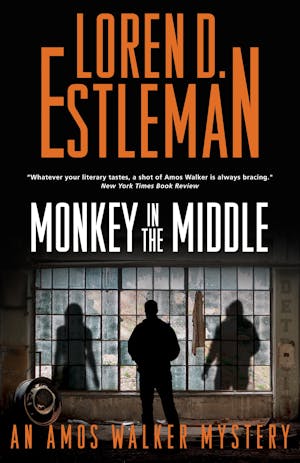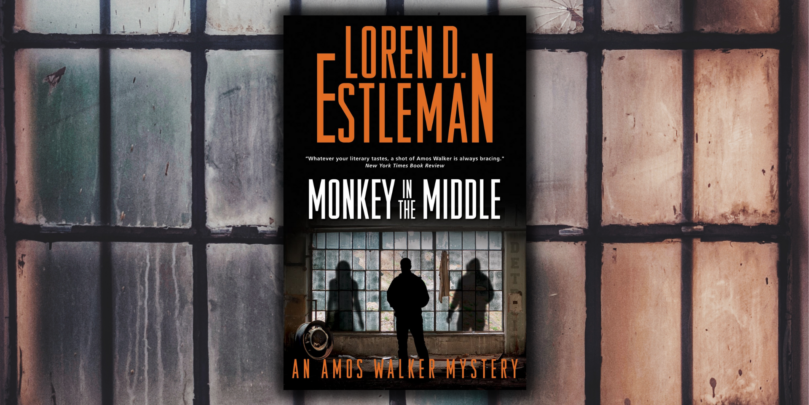 From the master of the hard-boiled detective novel and recipient of the Private Eye Writers of America Lifetime Achievement Award comes Loren D. Estleman’s next enthralling Amos Walker mystery, Monkey in the Middle.
From the master of the hard-boiled detective novel and recipient of the Private Eye Writers of America Lifetime Achievement Award comes Loren D. Estleman’s next enthralling Amos Walker mystery, Monkey in the Middle.
“Loren D. Estleman is my hero.” —Harlan Coben
The monkey in the middle is the one who “hears no evil.”
Private eye Amos Walker doesn’t have that luxury. Hearing the truth, on the other hand, is a lot less common, even from people who need his help.
It’s summer in Detroit and Walker’s just received word that his ex-wife has passed away. He can use a distraction, which arrives in the form of a young, would-be investigative journalist who has gotten in way over his head. He needs Walker’s protection, but is suspiciously vague about why and from whom. And he’s not the only one playing their cards way too close to their chest, including:
A bestselling author who claims to be retired, but who knows a good story when he hears one.
A fugitive whistleblower who skipped out on a $100,000 bond.
A headline-hungry defense attorney who spends as much time before the TV cameras as in court.
A career assassin with whom Walker has a long, ugly history.
Not to mention any number of covert government agencies pursuing their own agendas, possibly in opposition to each other.
Walker just wants answers, but what he finds is a dead body—and enough trouble to put him on ice for good, unless he can discover what everyone’s not telling him.
Monkey in the Middle will be available on June 21st, 2022. Please enjoy the following excerpt!
Chapter One
He was leaning against my car, ankles crossed, hands in his pockets, the universal body language of casual indifference. I ought to have been sore, and might have been except for the day I’d had; but it just seemed like too much effort.
I wouldn’t have had time anyway. As soon as he spotted me he sprang up straight, igniting spots of color on his cheeks; he was afraid he’d scratched the chrome. That should have embarrassed me more than it did him. Road salt had been eating at it since before the century turned.
In the right mood I’d have raised a blush, just to be sociable; but the kid had enough to go around.
You can’t fake that. If he could—wasn’t just what he seemed—it might have saved a world of hurt down the line, and possibly a life or two. But there’s no use dwelling on the past.
He was all corduroy and denim and scuffed Hush Puppies, eyeglasses with blue plastic rims; the Halloween store had run out of pirates and Darth Vaders and he was stuck with Teaching Assistant. His hair was chipmunk-orange and grew in every direction. Mom had given up trying to train it—and not too long ago, either. I had an unexpired passport older than he was.
“Mr. Walker?”
The voice was a surprise. Anyone who looked like him should come with a cracked tenor, not a light baritone. They’d gotten their voice chips mixed up back in the toy factory
“You were perched on his car,” I said. “What do you think?”
“I—your vehicle registration’s on record with the Secretary of State’s office. I went there after I saw your web site. I couldn’t make up my mind whether to go up and see you. You settled the point just now. You are Amos Walker?”
By “up” he meant two flights of stairs to my office in the pile across the street from the weedy lot where I parked the Cutlass.
Web site. I’d forgotten I had one; I paid the monthly fee along with the rent and utilities every first Monday and never thought about it afterward. In a weak moment I’d agreed to let Barry Stackpole build it. I hadn’t looked at it since the day it went up, and on the evidence neither had anyone else until now. This kid looked like job security—and that neighborhood looked like an English garden.
I said, “I’m closed. Come back some other time to some other place and pick on some other car.”
That day I might as well have stayed home, where doing nothing and not getting paid for it is more fun. That’s summer in Detroit. Everyone who can afford to leave town has fled, and those who can’t take their business to the cops. Domestic beefs, carjackings, and party shootings don’t leave much work for a private detective. The hours go by on a dragline.
Capped this time by the phone call I got just before quitting. News like that always comes when you’re at low tide.
He rummaged in all the pockets he had, retrieving wads of limp currency until he had enough for a stack. Homebound traffic wheezed past, shimmering in the heat, while he arranged all the bills until the grim gray faces stared skyward.
He had me at Ben Franklin. I wouldn’t have climbed back up all those stairs for anyone less than U.S. Grant.
His name was Shane—of course it was—and I gave him points for not sneering at the décor, the tasteful earth tones of dirty olive and oil spill. The hollows in the wooden seat on the customer’s side of the desk were made for his narrow haunches. Three stories down, hip-hop and reactionary politics drifted out the open windows of cars with busted air conditioners and over the sill into the office. A lukewarm breeze from the window fan I’d bought to replace the old oscillator made his thistly hair stir east, west, north, and south. It was fascinating to watch.
He was almost as restless as his hair. His eyes kept returning to the door we’d just come through. It was an ordinary enough door.
“Shane Sothern,” he said. “Maybe you know it.”
“Sure. Of the Port Huron Sotherns. Your great-great-grandfather posed for the top of the Penobscot Building.”
His smile shook me. I’m usually a better judge of character. That pile of tender on my blotter had changed all my plans for the evening. But I could get drunk anytime.
“My people were stock clerks and factory workers,” he said. “I’m the first in my family to attend college.” He reached inside his ribbed sportcoat, snapped open a newspaper clipping, and pushed it across the desk.
It was a feature from the front page of the entertainment section of the combined Sunday edition of the News and Free Press, the print smeared from handling. He shared a two-column color shot with a balding man whose fringe of white hair came to his collar, the two facing each other across a battleship-gray typewriter that looked as if it came with a pilot light. Sothern looked younger yet than today, but the man on the keyboard side was seventy years old in every photo I’d ever seen. He’d had a lock on all the best-selling book lists since whales had feet. The caption read: Gerald Rickey consults with Shane Sothern on a point of local history.
Sothern got up and came around the desk, leaning over my shoulder and mouthing what I was reading, as if he’d written it himself; never losing sight of the door. “It ran last December. That’s why I thought you might know me.”
“I was being presented at court. Collaborator?” I returned the clipping.
“Nothing so grand.” He went back and perched on his chair like a pigeon on a ledge. “I approached him when he spoke at the library downtown, to ask for advice. My work kept coming back from magazines and book publishers along with the usual impersonal regrets. I was just a kid; it never occurred to me I might be putting him on the spot. I even brought a briefcase full of manuscripts on the off chance he’d read them and give me some tips. I’m still surprised he didn’t have me thrown out of the place.”
“He read them? Offered encouragement?”
Came back the blush. “He encouraged me to give up writing. He said I lacked the divine spark.”
“What the hell’s that?”
“He said if I had to ask, I didn’t have it.”
“Nice guy.”
“Oh, but he is! And he was right. If he hadn’t been honest with me, I’d still be struggling. And he said I had a gift for research. In one afternoon online or at the library, I could dig up more useful material than he could in a week; he said that. God knows how he knew, just from reading my stuff. He admitted it was a talent he lacked. So he hired me as his researcher, and right away his reviews got better. Critics who’d been dismissing him as a pander to the masses complimented him on his eye for atmosphere and detail.”
“Isn’t that just reading?”
The eyes behind the glasses got bright. They were blue then, the same shade as his frames; they’d looked colorless before. “Anyone can read. Jerry said I had a knack for bringing back not just what he told me to get, but piles of color that brought the facts and figures to life. Last year he sent me to look up a street in Kansas City, Missouri, find out when it was paved and with what, asphalt or macadam or cobblestones. Well, while I was doing that, I came across an account of the day Buffalo Bill brought his Wild West show there. Along the parade route he spotted a local youngster in the crowd and invited him to share his carriage. The boy was Walt Disney.”
He paused, expecting me to show interest. I obliged.
“I told Jerry,” he said, nodding approval: “You know, the greatest showman of the nineteenth century imparting advice to the greatest showman of the twentieth.”
“That happened?”
“No one knows what they actually talked about. It could have; that’s the stuff of historical fiction. The passage was only three lines long, but Jerry turned the idea into a novel. See, most researchers would’ve brought back just what was asked for and left the rest. Played fetch. What I did required imagination, which is the most important tool a writer of fiction has. All I needed, and didn’t have, was the ability to put it into practice.”
“What’s the split?”
His face went flat as a plank. “Split?”
“The take. The dividends—royalties, I guess you call them. The good press must have boosted his sales. How far did he cut you in? I don’t guess it was fifty-fifty.”
“He pays me a straight salary.”
I drew a pencil from the navy mug I’d swiped from police headquarters, scratched my ear with the eraser, stimulating my cortex. I was starting to get the drift.
“Sweet deal—for him. He shares the credit and cashes the checks. Respect is for the dead. Get a lawyer and cut a better bargain. He’ll tell me what’s evidence so I’ll know it when I fall over it. I don’t have your imagination.”
His eyes got as big and blue as enamelware. “Oh, I don’t want to sue him! He’s not the only name author who farms out his prep, but he’s one of the few to acknowledge it. I didn’t ask to be in on the interview. He invited me. I’m happy with the arrangement. How much do you think publishers pay a fledgling writer? Nowhere near what he does.”
“So what am I supposed to do to earn”—I thumbed through the bills—“this starter fee? Five hundred a day’s my going rate.”
He paled a little, but he said, “I’ll have to manage it. There’s no other choice. Mr. Walker, there are lives at stake.”
The pencil was doing nothing for my brain. I blamed the pencil. I put it back in the cup and told him to start again.
“From the beginning?”
“Skip Disney. Give me the rest. All of it this time.”
Click below to pre-order your copy of Monkey in the Middle, coming 06.21.22!













Comments are closed.
Leave a Reply